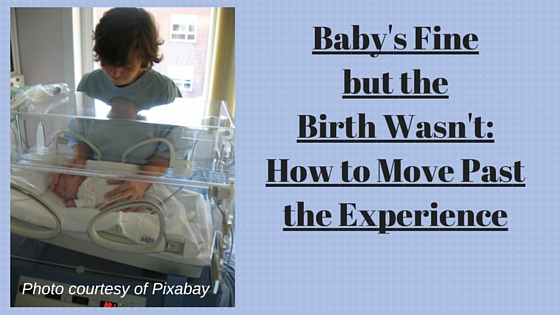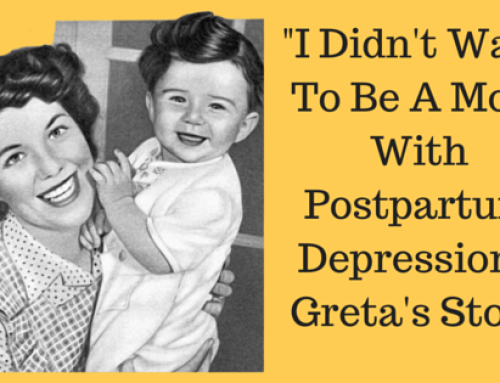You aren’t alone if you look back and remember the birth of your child with a measure of grief coupled with joy. Regret may overshadow a sense of satisfaction.
Of course, you deeply love your child. And you couldn’t be more grateful that your child is here with you.
Giving birth just wasn’t what you hoped it would be. Instead of leaving you feeling like you could conquer the world, it may have left you feeling angry, confused, or depressed.
At least five percent of women live through an undesirable or traumatic birth experience. Many more may not feel willing to express how they are feeling, lest they seem ungrateful.
Are you a parent who expected the exciting maternal culmination of your pregnancy, but got intrusive memories of complications, medical interference, or unplanned circumstances instead?
How do you move past such disappointment?
After all, the birth of your child is done. You can’t get those moments back.
That’s true. But you can recover with self-compassion, time, perspective, and support. Here are some ways to consider.
Acknowledge and accept your feelings.
Allow yourself time and a safe place to feel what you need to feel. Your lost dream deserves consideration.
It’s important to recognize that your experience mattered – to you, to your partner if you have one, and to your baby.
Honestly observe and examine your feelings about the birth. Acknowledge your disappointment without guilt.
Speak kindly to yourself.
Give yourself a break. Yes, you have a new baby to care for. Yes, your family needs you. Those concerns are valid and absolutely require your attention.
However, it’s important to pay careful attention to your inner self-talk as you meet your new responsibilities.
Do you tell yourself to “get over it,” “just move on,” or pressure yourself to “pull it together?”
Notice those thoughts, then choose instead to remind yourself that you are not a weak or unworthy mother for feeling negatively about the birth. Your disappointment deserves attention and isn’t an indictment of your parenting or personality. Extend to yourself the same degree of compassion you would a suffering friend.
Choose your support team wisely.
Don’t isolate. Ruminating on the birth experience and bottling up your feelings may lead you down an anxious and depressive path. Share your feelings with people who understand.
Unfortunately, you may find that, though friends and family mean well, they don’t get it.
The loss of your desired birth experience may not seem like a “real” loss to them.
If you find that you are being advised to “focus on the baby,” “put it behind you,” or be “grateful” without really being heard, you know that you need to look elsewhere for understanding.
Try a local or online support group, or schedule time with a skilled therapist trained in helping to resolve birth trauma to really work through ways to integrate your experience.
Reconnect with your partner, if you have one.
Your difficult birth experience may also be difficult for your partner.
He or she may have witnessed the events and internalized emotional pain, fear, or helplessness too.
Talk to each other. You may both be struggling in different ways. Try not to allow the birth experience to divide you, but develop a deeper level of connection and understanding.
Talk through the experience with your baby as well.
You may feel that your baby is too young to understand what you say to him or her, and that he or she will not remember the birth experience.
However, research has shown that humans are more likely to interpret the meaning of what you say by the feelings you express behind your words, and by your body language, than by the actual words themselves.
Research has also shown that babies can remember their births, in their bodies.
Narrating the story of your birthing experience, with it’s complicated emotions, can help both you, and your baby to move through the experience together. It is important for your baby to hear and feel that you understand the experience wasn’t ideal, and that you will help him or her to process it.
For assistance with this process, contact a therapist trained in helping to resolve birth trauma.
Resist the urge to neglect wellness and self-care.
Birth is a deeply physical, emotional, and spiritual experience.
Your body and mind require comfort and care to move forward. Amidst the business of new parenthood, self-care may seem impractical. Still, to integrate the birth experience, time to care for yourself is vital.
Consider mindfulness meditation, massage, or yoga. Deep breathing exercises, journaling, nourishing foods, fresh air, and as much rest as possible will support recovery and mental clarity.
When you are comforted and your body is processing efficiently, resolving the birth experience may seem less overwhelming.
As you work through the birth experience honestly, you may find you are also better able to work through the complexity of your feelings over time. Lean on those who understand.
Keep moving forward. You can cope and grow stronger despite your disappointment.







Leave A Comment